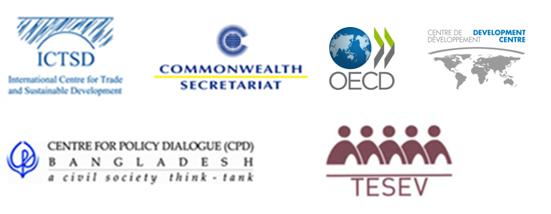Philanthropy and private sector
Trade and Development Symposium on Least Developed Countries (Istanbul, 10-11 May 2011)
In conjunction with the Fourth UN Conference on the Least Developed Countries (UNLDC IV), this Symposium brought together policy makers, academics and experts from international organisations, civil society and the private sector to identify innovative strategies for tackling the implementation challenges of the UNLDC IV outcome towards structural transformation in LDCs.
> Website: www.istanbulsymposium.org
Panel 1: Implementation and monitoring of the UNLDC IV Outcome
While the articulation of a fresh and innovative partnership agreement between the LDCs and their de-velopment partners for the Istanbul Conference remains a challenge, the designing of its delivery me-chanism will be of decisive importance. This is particularly so, as one of the critical fault lines of the Brus-sels Programme of Actions (BPoA) had been its weak implementation and monitoring mechanism. In order to have a really meaningful outcome at the UNLDC IV, the new programme needs to have not only a strong strategic focus, but should contain identified delivery tools for specific targets, provisions of ne-cessary financial and other resources, and a strengthened institutional mechanism for effective follow-up.
Chair: Debapriya Bhattacharya, Distinguished Fellow, CPD
Panelists:
- Upendra Yadav, Deputy Prime Minister and Minister of Foreign Affairs, Nepal
- Ana Luiza Cortez, Chief, Secretariat of the Committee for Development Policy, UNDESA
- Charles Gore, Special Coordinator, Africa, LDCs and Special Programmes, UNCTAD
- Mehmet Arda, Professor, Galatasaray University, Turkey
- Mario Pezzini, Director, OECD Development Centre
Panel 2: Enhancing trade capacities in LDCs
Discussants offered their views on issues such as the granting of universal preferential, secured and predictable market access conditions for all LDCs, including full duty-free and quota-free market access in developed countries and emerging economies, and the reforming of preferential rules of origin and non- tariff measures, will be addressed. Participants will also look at measures to enhance the export and market diversification of LDCs and support structural changes within their economies, including Aid for Trade (AfT).
Chair: Ricardo Meléndez-Ortiz, Chief Executive, ICTSD
Panelists:
- L. V. Ketso, Minister of Trade and Industry, Cooperatives and Marketing, Lesotho
- Enoch Kavindele, Former Minister of Trade and Vice-president, Zambia
- Hoseana Bohela Lunogelo, Executive Director, ESRF, Tanzania
- Posh Raj Pandey, Chairman, SAWTEE, Nepal
- Mustafizur Rahman, Executive Director, CPD, Bangladesh
Panel 3: Strengthening LDCs and emerging economies’ partnership
This session looked at the UN LDC IV recommendations and follow-up measures in the domain of South- South cooperation which has emerged in the past decades as a result of a massive shift in wealth globally. In particular, participants will address the effectiveness of South-South trade and technology transfer, the importance of capacity-building, and how aid and trade-related development assistance may support re- gional cooperation and the dynamics of economic and political integration. Discussions will also consider domestic policies and reforms, which should act as a catalyst for enhancing structural transformation, thereby achieving sustainable development goals and alleviating poverty.
Chair: Cyrus Rustomjee, Director, Economic Affairs Division, Commonwealth Secretariat
Panelists:
- Mustafa Sahin, Vice President, TIKA, Turkey
- Helmut Reisen, Head of Research, OECD Development Centre
- George Mavrotas, Chief Economist, GDN
- Ekrem Yener, Chief International Expansion Officer, Turkcell
- Suchat Katima, Executive Director, Mekong Institute
- Sorasak Pan, Secretary of State, Ministry of Commerce, Cambodia
Panel 4: Tackling structural vulnerabilities and enhancing resilience of LDCs to crisis
Economic vulnerability in LDCs has many structural causes like a narrow production base, dependence on few commodities as export, or transport constraints, just to mention a few. In particular, vulnerability related to LDC reliance on agriculture, fisheries and tourism is in turn highly correlated with the environ- ment and climate changes. Other aspects of LDC vulnerability include institutional weakness, political fra- gility related to governance or post-conflict state or the lack of human capacity. Finally, the volatility of food prices and the global economic crisis have risen to prominence in recent years, posing serious chal- lenges for the sustainable development prospects of the LDCs. Discussions over these issues will seek to chart a course forward to address the specific challenges faced by the LDCs.
Chair: Can Paker, Chairperson, TESEV
Panelists:
- Supachai Panitchpakdi, Secretary General, UNCTAD
- Sir Richard Jolly, Member of the LDC Eminent Persons Group
- Andris Piebalgs, EU Commissioner for Development
- Nirj Deva, Member of EU Parliament
- Michele Klein Solomon, Permanent Observer to the UN, IOM
- Patrick Gulliaumont, President, FERDI, France
Related Documents
